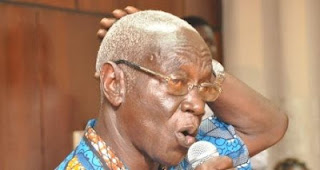Presiding officers have the discretion to admit unstamped ballots -Dr Afari-Gyan
 |
| Electoral Commission Chairman, Dr Kwadwo Afari-Gyan |
He told the court, Wednesday that, “the presiding officer and those who are at the polling station may decide upon doing certain investigations that ballot (unstamped ballots) may be acceptable.”
Dr Afari-Gyan made this admission when lead counsel for the petitioners, Mr Philip Addison pointed out to the second respondent that there were some irregularities on the pink sheets as presiding officers had appended their signatures to the pink sheets before voting started, whereas some presiding officers failed to sign the pink sheets even after the results had been declared at the polling station.
Dr Afari-Gyan explained to the court that although he did not know of such occurrences, irregularities were bound to happen since “there are prescribed ways” of doing things, thus failure to follow the rules would result in irregularities.
Mr Addison drew the attention of Dr Afari-Gyan to instances where some ballot papers were not stamped with the official mark of the EC by the EC official, and that such an action resulted in the disenfranchisement of some voters.
However, according to Dr Afari-Gyan, he was not aware of any such occurrence and that if during the count it was noticed that there was a ballot paper which did not bear the polling station stamp it might or will be rejected by the EC official.
“It may be rejected because the presiding officer and those who are at the polling station may decide upon doing certain investigations that ballot may be acceptable,” he told the court.
Upon further queries, Dr Afari-Gyan told the court that there was a general rule of thumb that “if a ballot paper is not stamped then the likelihood is that it may not have been acquired and cast in the proper way but if in the wisdom of the people who are conducting the election, the number of voters would correspond to the number of ballots in the ballot box and one is not stamped they could admit it as a valid ballot.”
“Do you have this in your rules that a presiding officer has the discretion when the ballot is not stamped?” Mr Addison asked.
“We prescribe that.”
“That is why I ask you that are you telling this court that a presiding officer has the discretion with respect to a ballot that is not stamped?”
“In a situation like this, yes my Lords,” Dr Afari-Gyan admitted to the court.
He explained to the court that presiding officers were vested with the overall powers during the voting process, adding that, “the presiding officer has the last word on every matter that happens in the polling station. He is completely in charge at the polling station.”
On further matters of irregularities on the face of the pink sheet, Dr Afari-Gyan told the court that a presiding officer could be induced not to sign a pink sheet for a desired purpose.


Comments
Post a Comment